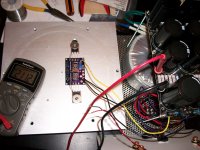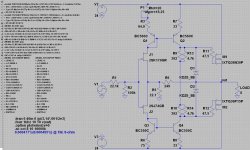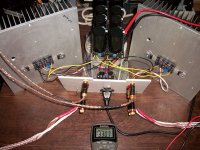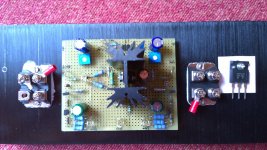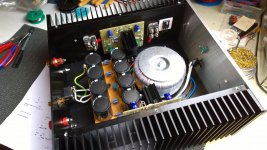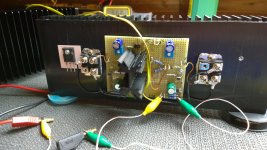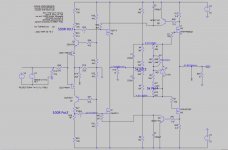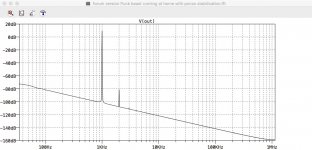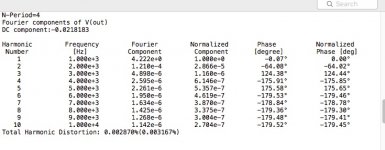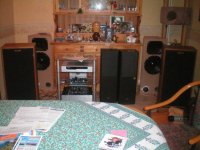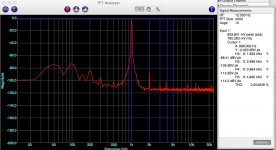OK curiosity got the better of me as I had to hear the F4 Beast at the proper bias current of around 2.0Amps and a supply of about 27Vdc so I disconnected one of the channel of the F6 that you see below the breadboard.
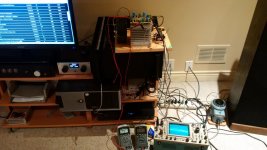
So how did it sound you may ask? It is brighter than the F6 but has all the bass control that I love of the F6. The horns and vocals are definitely clearer and cleaner a very nice sounding amplifier indeed.
As you can see I'm using the Willow II preamp which has about 20dB gain which the F4 Beast has the same FET and Buffer chip in it so it combined has about 40dB so we are not short on volume!
As I do not have a proper sized heat sink I resorted to a small fan driven by the Variac so the temperature is easily controlled. I did take the bias upto 3.5Amps but did not notice any difference in sound quality from 2 Amps.
One very strange phenomena that I have witnessed is that even reducing the bias to 300mA the quality did not seem to suffer maybe a little on the volume level noticeable on the scope difficult to hear. When building the F6 the bias had a noticeable effect.
Any way just now need to save up for yet another power supply case and FET's to build a complete amplifier. Thanks to all for making this a great journey especially Mr Pass for the bones he throws to us.🙂

So how did it sound you may ask? It is brighter than the F6 but has all the bass control that I love of the F6. The horns and vocals are definitely clearer and cleaner a very nice sounding amplifier indeed.
As you can see I'm using the Willow II preamp which has about 20dB gain which the F4 Beast has the same FET and Buffer chip in it so it combined has about 40dB so we are not short on volume!
As I do not have a proper sized heat sink I resorted to a small fan driven by the Variac so the temperature is easily controlled. I did take the bias upto 3.5Amps but did not notice any difference in sound quality from 2 Amps.
One very strange phenomena that I have witnessed is that even reducing the bias to 300mA the quality did not seem to suffer maybe a little on the volume level noticeable on the scope difficult to hear. When building the F6 the bias had a noticeable effect.
Any way just now need to save up for yet another power supply case and FET's to build a complete amplifier. Thanks to all for making this a great journey especially Mr Pass for the bones he throws to us.🙂
Finally got around to trying out a naive version of the F4 Beast. I did not use the "large" FETs from the first post of this thread, opting instead for the IXYS IXTQ36N30P/IXTQ36P15P. The amp settles around 1A bias.
I call this version naive since the thermal feedback is so simplistic. It does keep the bias from running away, but the bias wanders considerably between 850-1150mA. This could be because the heatsink is currently flat against the table and cannot breathe. This version also has the issue that I lose output potential because of the drop across R9/R10, but I am not worried about this since I won't need the full output power anyway. I have another, more elaborate version planned out, but it will have a higher associated cost. This version was easily built with parts on hand...
Have not listened to it yet, as I am waiting to see if it remains stable...
I call this version naive since the thermal feedback is so simplistic. It does keep the bias from running away, but the bias wanders considerably between 850-1150mA. This could be because the heatsink is currently flat against the table and cannot breathe. This version also has the issue that I lose output potential because of the drop across R9/R10, but I am not worried about this since I won't need the full output power anyway. I have another, more elaborate version planned out, but it will have a higher associated cost. This version was easily built with parts on hand...
Have not listened to it yet, as I am waiting to see if it remains stable...
Attachments
Built the second channel of the "naive" F4 Beast last week and finally got around to hooking up both channels to have a listen. Please forgive the crudity of the temporary construction.
Because of my overly simplistic, caveman-like approach to forcing thermal stability, I have renamed my "naive" implementation the F4 Mammoth to emphasize its paleolithic nature. It is idling quite stably at a little over 800mA per channel. I will dismantle it soon to see if I can increase this to closer to 1A per channel. Seems the thermistors have more say about the total bias than the bias resistors, as I keep increasing resistor values with no change in bias... Also, the amp takes quite a while to climb to full bias, which is the opposite of what I expected. 😕
Sounds quite good. Dead silent with no signal through it - no hum or buzz with ears pressed right up to the speaker cone. A little "thin" in the mids, but this is probably just the complete absence of distortion that these amps seem to exhibit. Highs are nice in general, though can sound etched on some recordings. Seems to be the recording at fault, which my more forgiving Aleph clone smoothed out. Bass is strong and articulate. Very detailed sound with surprisingly (!) wide sound stage.
I feel I am earning my 'Fearless Amp Builder' badge as the amp is hooked up in my primary system without any speaker protection network for its maiden voyage...
Because of my overly simplistic, caveman-like approach to forcing thermal stability, I have renamed my "naive" implementation the F4 Mammoth to emphasize its paleolithic nature. It is idling quite stably at a little over 800mA per channel. I will dismantle it soon to see if I can increase this to closer to 1A per channel. Seems the thermistors have more say about the total bias than the bias resistors, as I keep increasing resistor values with no change in bias... Also, the amp takes quite a while to climb to full bias, which is the opposite of what I expected. 😕
Sounds quite good. Dead silent with no signal through it - no hum or buzz with ears pressed right up to the speaker cone. A little "thin" in the mids, but this is probably just the complete absence of distortion that these amps seem to exhibit. Highs are nice in general, though can sound etched on some recordings. Seems to be the recording at fault, which my more forgiving Aleph clone smoothed out. Bass is strong and articulate. Very detailed sound with surprisingly (!) wide sound stage.
I feel I am earning my 'Fearless Amp Builder' badge as the amp is hooked up in my primary system without any speaker protection network for its maiden voyage...

Attachments
Last edited:
Well done!
I too noticed the thermistor had a lot more effect on the bias but there seems to be a equilibrium point 2picodumbs made comment about this and even gave the value of around 3.9kohms.
Yes I only connected it up to my listening speakers once I knew it was stable and little offset. Regarding the mids I had the opposite impression for me it brought them out when comparing to the F6. Still we all have got here by different means congratulations again. Temporary construction for me is the most interesting to see, how people mount stuff is sometimes very illuminating.
I too noticed the thermistor had a lot more effect on the bias but there seems to be a equilibrium point 2picodumbs made comment about this and even gave the value of around 3.9kohms.
Yes I only connected it up to my listening speakers once I knew it was stable and little offset. Regarding the mids I had the opposite impression for me it brought them out when comparing to the F6. Still we all have got here by different means congratulations again. Temporary construction for me is the most interesting to see, how people mount stuff is sometimes very illuminating.
Hi needtubes,
😀'Fearless Amp Builder' badge is applied....!😀
concerning the sound and thinness, stage and other mentioned aspects...
I heard them as well!
with the Sony frontend (simplified without CFB) you can simply change the sound from dark to bright by changing the load resistor, lower ---darker, lifeless
or by changing the current through the second stage...easier and better...more current brighter like morning sun or less relaxed to sleep in the dawn.... :--))
you get in this way a huge scale of sound configurations.
🙂
😀'Fearless Amp Builder' badge is applied....!😀
concerning the sound and thinness, stage and other mentioned aspects...
I heard them as well!
with the Sony frontend (simplified without CFB) you can simply change the sound from dark to bright by changing the load resistor, lower ---darker, lifeless
or by changing the current through the second stage...easier and better...more current brighter like morning sun or less relaxed to sleep in the dawn.... :--))
you get in this way a huge scale of sound configurations.
🙂
Jeff still in winter sleep ..... ?
😀😀😀
Need to get off my ****. Still waiting on iec power socket to arrive.
Finishing off the last details with the case is holding me back.
Hi gents,
some progress at my side: Got the FE-boards stuffed and one of them wired and basically tested without supplies attached. Next step is very interesting. Will the whole thing work as simulated? First results can be anticipated after easter holidays.
Regards, Jürgen
some progress at my side: Got the FE-boards stuffed and one of them wired and basically tested without supplies attached. Next step is very interesting. Will the whole thing work as simulated? First results can be anticipated after easter holidays.
Regards, Jürgen
Attachments
I have placed the resistors (3x 1R) on the FE - pcb. I am rather targeting to get an idle of around 1.6A instead of 2A. I fear that the heatsinks of my amp are too marginal and I don`t wanna frie eggs.
I shared already many drafts here in the thread....🙂
I will do your idea like this attached....
I want the bias of the second stage to be adjusted more independent from the OS stage.
And I have the impression that the "classic" Nelson biasing with TL and thermistor is faster in stabilizing and sounds for my ears even a bit better than the biasing with a resistor in the drain connection of the SK/SJ.
Maybe the result of the bootstrapping with the Silmic II caps.......possibly euphonic, but I like it.
You see the k2 is very dominant, but.....
is it true Mr. Pass that with these low distortion levels the k2/k3 ratio is no more so important?
🙂🙂
I will do your idea like this attached....
I want the bias of the second stage to be adjusted more independent from the OS stage.
And I have the impression that the "classic" Nelson biasing with TL and thermistor is faster in stabilizing and sounds for my ears even a bit better than the biasing with a resistor in the drain connection of the SK/SJ.
Maybe the result of the bootstrapping with the Silmic II caps.......possibly euphonic, but I like it.
You see the k2 is very dominant, but.....
is it true Mr. Pass that with these low distortion levels the k2/k3 ratio is no more so important?
🙂🙂
Attachments
Last edited:
Oh no,
may be I made a fault, pr says in my draft the regulation will not work. Danger that the drivers got too hot.
Sorry!
I must think it again.... :-((
may be I made a fault, pr says in my draft the regulation will not work. Danger that the drivers got too hot.
Sorry!
I must think it again.... :-((
Meanwhile I understand that my separation of OS bias and driver bias arrangement destroyed the regulation.
And I wanted to be especially clever.....o.k. 🙄
Here first picture my chaotic living room with two old Klipsch Forte I and two clones of Unison Max 1, still to be tuned and Meridian CD player and a Goldmund Mimesis Clone from
Jims Audio driving the Puck beast in an old FW case.
My wife is so tolerant at the moment, good times......:--))
Second picture shows the distortion of my Puck Beast at the moment.
Still 47R source resistors in the second stage bridged with Silmic caps 3300uF.
Fairly high OLG, CLG a bit more than 20dB and feedback around 30dB.
Of course 1W at 8 Ohm.
Not so bad.... imagine I get k2 even lower so the THD is very very low.
Ugly the hum around 50 and 100Hz. I can hear it only with ears at the speakers.
Nevertheless with so low distortion values this does not look smart.
Hope to find it.
Forgot the smaller speakers are old JBL from my wife.
And I wanted to be especially clever.....o.k. 🙄
Here first picture my chaotic living room with two old Klipsch Forte I and two clones of Unison Max 1, still to be tuned and Meridian CD player and a Goldmund Mimesis Clone from
Jims Audio driving the Puck beast in an old FW case.
My wife is so tolerant at the moment, good times......:--))
Second picture shows the distortion of my Puck Beast at the moment.
Still 47R source resistors in the second stage bridged with Silmic caps 3300uF.
Fairly high OLG, CLG a bit more than 20dB and feedback around 30dB.
Of course 1W at 8 Ohm.
Not so bad.... imagine I get k2 even lower so the THD is very very low.
Ugly the hum around 50 and 100Hz. I can hear it only with ears at the speakers.
Nevertheless with so low distortion values this does not look smart.
Hope to find it.
Forgot the smaller speakers are old JBL from my wife.
Attachments
- Home
- Amplifiers
- Pass Labs
- F4 Beast Builders
